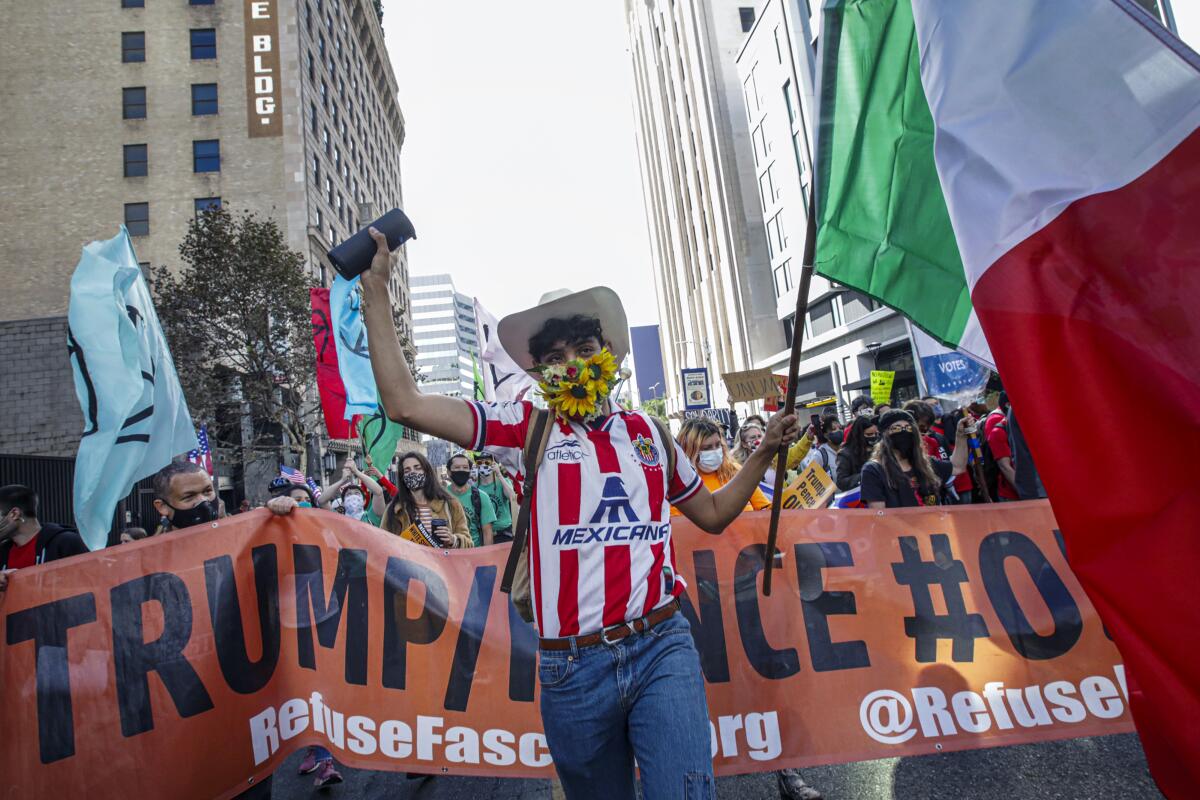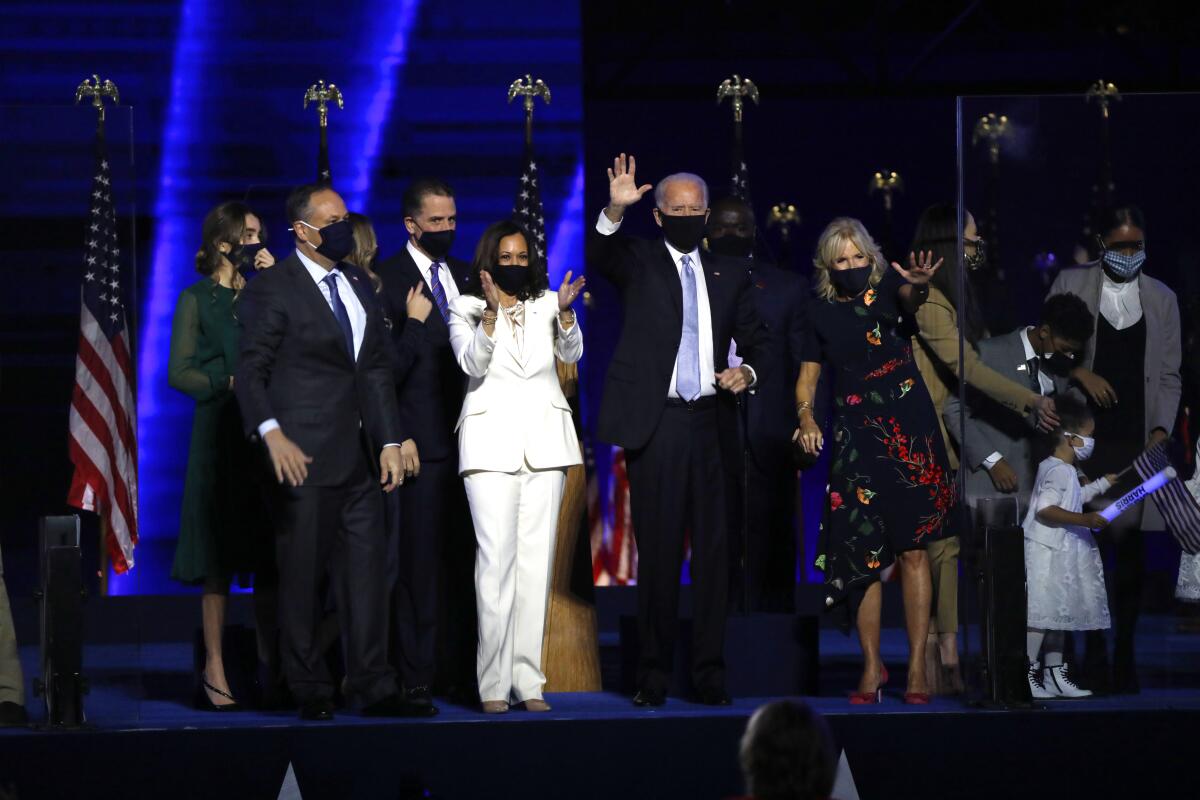Essential Politics: Impeachment. Election. Pandemic. Here’s a look back at a stormy year.

- Share via
WASHINGTON — What a year.
That’s how these kinds of year-end pieces always start, right? But if there’s a year that cliché is true, it’s 2020 — the year “unprecedented” became hackneyed.
An unprecedented impeachment trial? Check.
An unprecedented once-in-a-century pandemic? Check.
An unprecedented presidential election? Check.
Amid the whiplash of 2020, it’s easy to forget all that happened, or at the very least, how it happened. One of my favorite 2020 Times stories wasn’t about politics at all. It was this piece by audience engagement editor Rachel Schnalzer on how the conditions of 2020 were uniquely poised to warp our sense of time.
Now we have an opportunity to recalibrate. In this newsletter, we zoom out and explore the broader context of the news of the week — how do all these pieces make up a whole? The whole is clear: a year that was at turns chaotic and triumphant in both Washington and Sacramento. Worth our consideration are the events that made it that way. Without further ado, here’s your Essential Politics year in review.
Get our L.A. Times Politics newsletter
The latest news, analysis and insights from our politics team.
You may occasionally receive promotional content from the Los Angeles Times.
The biggest stories of 2020
Impeachment. On Jan. 16, the Senate began considering articles of impeachment to determine whether President Trump should be removed from office — the third trial conducted in American history. Trump stood accused of abusing the power of his office and obstructing Congress’ investigation into his conduct. The president was impeached by the House in December for asking Ukraine to investigate former Vice President Joe Biden as the administration withheld nearly $400 million in U.S. aid. But the Republican-controlled Senate acquitted him three weeks later. Revisit our full coverage here.
The pandemic. Where does one even begin? Perhaps we start Jan. 31, when Trump banned travel from China. Or maybe it’s Feb. 29, when news broke of the first reported death on American soil. Then there’s March 12 and 13 — when most professional sports and the NCAA shut down, Los Angeles schools closed and Trump declared a national emergency.
The pandemic was THE the dominant issue for lawmakers this year, with national equipment shortages, stimulus negotiations that grew tense, catastrophic unemployment levels, violent protests stoked by Trump himself over public health policies, and outbreaks at the highest levels of government. Trump admitted to downplaying the pandemic while Biden and fellow Democrats made addressing it head-on part of their platforms. We end the year with two vaccines, news of another stimulus package that Trump has thrown into doubt and a tough road ahead for Biden. To date, more than 18 million Americans have been infected and 320,000 have died from the coronavirus.

George Floyd’s death. George Floyd lived as many Black Americans do. His life was affected by racism and recently the crushing effect of the pandemic. His death under the knee of a Minneapolis police officer on May 25 became a rallying cry around the world, energizing voters and upending an election season underway. The fallout also brought violence and renewed attention to Trump’s poor record on race and his administration’s ties to white nationalist and extremist groups.
Ruth Bader Ginsburg and Amy Coney Barrett. In a year of loss, the Supreme Court didn’t emerge unscathed. Justice Ruth Bader Ginsburg — the court’s leading liberal voice, a trailblazing civil rights icon and a pop culture figure — died Sept. 18 due to complications from cancer. It didn’t take long for her death to spark a political battle. Trump and his allies sought to approve a conservative justice before November, despite pushback from Democrats and others who felt it was too close to the election. Barrett’s confirmation proceeded at a rapid pace and in a deeply partisan fashion unseen in the court’s history.
Joe Biden and Kamala Harris win. It was a stunning win for so many reasons. Biden will be the oldest president ever, at age 78. It was his third run, and he unseated an incumbent — a rare feat in American history. Running mate Harris will be the first woman to be vice president, as well as the first Black person and first Asian American. Americans waited four excruciating days for poll workers across the country to finish counting record numbers of ballots, many of them sent by mail. Not surprisingly (see above), Trump has refused to accept his clear defeat and has spent the last 46 days leading a falsehood-filled campaign to overturn the results and remain in the White House.

A few things you may have forgotten about...
In a normal year, these stories might have dominated coverage. In some cases, they did, but were quickly overshadowed by the pandemic. This is by no means an exhaustive list, but we’d be remiss not to mention:
- Jan. 3: Iranian Gen. Qassem Suleimani was killed in a U.S. airstrike in Iraq.
- Feb. 20: Trump ally Roger Stone was sentenced to 40 months in prison for crimes committed during the special counsel and congressional investigations of Russian interference in the 2016 presidential campaign. Trump commuted his sentence July 10.
- May 7: The Justice Department dropped charges against former national security advisor Michael Flynn. Trump pardoned him Nov. 25.
- June 15: The U.S. Supreme Court ruled that Title VII of the Civil Rights Act of 1964, which makes it illegal for employers to discriminate because of a person’s sex, also covers sexual orientation.
- July 8: The Supreme Court rejected claims of presidential immunity and rules Trump must release his financial records to prosecutors in New York.
- July 17: Rep. John Lewis, civil rights icon and longtime congressman, died.
- Aug. 20: Former Trump advisor Stephen K. Bannon was arrested and charged with fraud over a private fundraising campaign to build a border wall.
- Sept. 27: The New York Times published lengthy stories on more than two decades’ worth of Trump’s personal tax returns. Among the revelations: He paid $750 in federal taxes in 2016 and again in 2017.
- Nov. 4: California’s ballot measure campaign season ended with voters granting companies such as Uber and Lyft the right to keep their drivers as independent contractors.
- Nov. 9: Trump used Twitter to announce that Secretary of Defense Mark Esper had been fired.
- Dec. 14: U.S. Atty. Gen. William Barr, one of President Trump’s staunchest allies, resigned.
And a few that are uniquely California.
I asked Sacramento bureau chief John Myers for his picks. Here’s what he had to say:
- On March 19, Gov. Gavin Newsom announced extraordinary measures directing all Californians to stay at home because of the pandemic. Although the initial restrictions were loosened, a new wave of the pandemic prompted a new order this month.
- Amid a national shortage of equipment, Newsom‘s decision to spend almost $1 billion in taxpayer funds to buy protective masks drew national attention as an aggressive move by California — one shrouded in secrecy and controversy. The company required several deadline extensions.
- Amid record unemployment numbers, California struggled to provide aid. The system was plagued by long wait times, dated technology and fraud estimated to total $2 billion.
- It was a banner year for California’s ballot propositions, with some of the most expensive campaigns and high-profile measures the state has seen.
- Phil Willon and Patrick McGreevy reported yesterday that Alex Padilla, a Los Angeles Democrat who rose through local and state political office to become California secretary of state, will replace Kamala Harris in the U.S. Senate. Padilla will be the state’s first Latino senator.
Check out The Times’ full 2020 timeline here.
Enjoying this newsletter? Consider subscribing to the Los Angeles Times
Your support helps us deliver the news that matters most. Become a subscriber.
A story round-up to end your year
— Harry Reid made Nevada a presidential battleground. Now the retired senator wants more — for Nevada to go first in choosing the president, an acknowledgement that “the power structure of this country is moving West,” he tells Mark Z. Barabak.
— What’s in the new stimulus bill that Congress passed Monday? It includes $600 checks, new museums and a lot more, writes Jennifer Haberkorn. But Trump is threatening to torpedo the package unless lawmakers increase the direct payments.
— Yesterday Trump pardoned Duncan Hunter, the former California congressman who last year pleaded guilty in a campaign finance scandal, among 15 others as the president races to reward allies and settle scores in the final weeks of his term, Chris Megerian and David Lauter write.
— Outgoing Atty. Gen. Barr said Monday he saw no reason to appoint a special counsel to investigate Biden’s son, a parting rebuke to Trump as he leaves office this week, Del Quentin Wilber reports.
— Biden plans to nominate Miguel Cardona as secretary of Education, Evan Halper writes. The schools chief in Connecticut pushed to reopen campuses during the COVID-19 pandemic and emerged as a consensus choice thanks to the backing of teachers unions and Latino activists.
— Phil Willon has a Q and A with incoming California Sen. Alex Padilla on his career and historic appointment. And who will replace Padilla as secretary of state? Newsom has picked Democratic Assemblywoman Shirley Weber, from San Diego, to fill the role, John Myers and Taryn Luna report.
— As California grapples with staggering levels of unemployment benefit fraud, lawmakers and security experts say the state let its guard down well before the COVID-19 pandemic, failing to keep up with what other states have done to flag bogus claims, McGreevy reports.
— Elections officials in Inyo County said Monday that at least 70% of the signatures submitted to block a California law banning the sale of flavored tobacco are invalid, with dozens of voters saying they never signed the petition, John Myers writes.
A note from the Essential Politics team
This is the last Essential Politics newsletter of 2020. We’re taking a few days off for the holidays. John Myers will be back in to your inbox on Jan. 4.
We’d like to offer a special thanks for the many subscribers to this newsletter and to the Los Angeles Times. Your support ensures our journalism will continue to thrive in 2021 and beyond!
Stay in touch
Keep up with breaking news on our Politics page. And are you following us on Twitter at @latimespolitics?
Did someone forward you this? Sign up here to get Essential Politics in your inbox.
Until next time, send your comments, suggestions and news tips to politics@latimes.com.
Get the L.A. Times Politics newsletter
Deeply reported insights into legislation, politics and policy from Sacramento, Washington and beyond. In your inbox twice per week.
You may occasionally receive promotional content from the Los Angeles Times.



